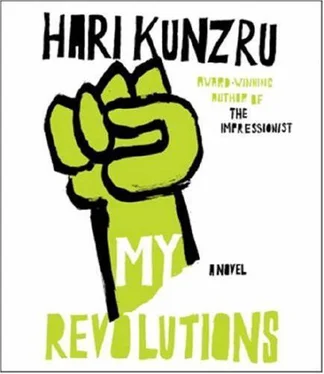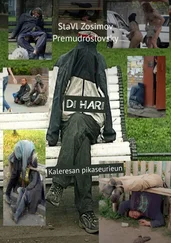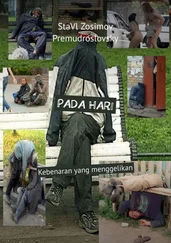TWO DEAD, OTHERS SOUGHT AFTER LONDON TERRORIST RAIDS
The shopkeeper watched me curiously as I tore off the plastic wrapping and read. The article was frustratingly terse. Following a tip-off, police had raided premises in north and east London, looking for weapons and explosives. They’d arrested three men
and two women and retrieved a number of small arms. On the same afternoon, armed police had been involved in a gun battle on a residential street in Shepherd’s Bush, after a vehicle had failed to stop when requested. The occupants of the vehicle opened fire on the police, killing one, a Sergeant Terence Denham, aged thirty-two. One of the terrorists was also killed. Another, who was seriously wounded, surrendered. The dead gunman was named as Sean Michael Ward, of West Kensington. Police were seeking a twenty-six-year-old woman, Anna Louise Addison, who had fled the scene, hijacking a car that was later found abandoned in Camden Town. A watch on coastal ports and airports had so far failed to produce any results. Members of the public were warned not to approach her as she was believed to be armed.
Sean was dead. At first I flatly refused to accept it. I spent the next few days scouring every bookstall and hotel lobby in the city for English-language papers and magazines. Though I was half mad with guilt, I didn’t dare ask other travelers directly, fearful of drawing attention to myself. I clung to the irrational hope that the Times article was wrong or would turn out to be some kind of police ploy. Eventually I found an old American news weekly, which confirmed the worst. It had happened a few days after I’d left. Leo had been shot in the stomach. The police were holding Jay, Claire, Quinn and several others, at least two of whom I didn’t know. Nowhere was my name mentioned. And Sean Ward was dead. They’d printed a picture of the street, cordoned off with tape. A BMW was slewed across the pavement, its windows shattered, its doors hanging open, visibly punctured by nine-millimeter rounds. Beside the car lay a form covered with a white sheet. Sean was dead because I’d betrayed him. I’d killed him as surely as if I’d pulled the trigger myself. My feeble attempt to keep Anna out of it now just seemed ridiculous. I ought to have found another way — written a letter to the papers, warned Gertler. Anything but tell Miles. My emotions led me in all sorts of directions. I considered going to Lebanon, giving myself up to the PFLP. I thought of going home and surrendering to the authorities. I assessed various methods of killing myself. My only
comfort, if such a word is appropriate, was that Anna had escaped. For the policeman, who was apparently a member of the Special Patrol Group and trained to use firearms, I had no feelings. A pig, to me, was just a pig.
I was sitting in the Pudding Shop, trying to work up the courage to go back and throw myself off the roof of my hotel, when a Dutch couple offered me a lift in their bus. They were heading for Erzerum, then Tehran. As it turned out, Peter and Justine were junkies. They showed me a way to sidestep the horror, an instant method of coming to terms with my confusion and guilt. We trundled up the rutted road into the mountains and gradually I made myself a stranger to the world. The wheels turned round and I disappeared.
Somewhere in Iran, I left my Dutch friends, who wanted to push on to India. I arrived, perhaps in a taxi or riding on the back of someone’s truck, in a village whose name I never knew. It was an ancient and apparently timeless place, on which the world could surely never intrude. The fields were tilled with wooden plows. Old men in woollen caps sat in the doorways of crumbling houses. I made my wishes known by signs, finding a room with a packed-earth floor and a neighbor who brought me food and enough opium to prevent me from giving a damn about who’d lived and who’d died because of me. I spent my days with Abbas and Hamid, the layabouts who fed the fire for the village hammam , watching them lower themselves into a pit of bitumen, coming out black from the waist down. Together we sat and smoked and watched the snow on the mountain. The air was clean and pure, the sky a dome of blue tile.
All I’d wanted was certainty, a solid place to stand, but the more I’d tried to produce it, the more ambiguity had grown up in my life, choking it like pond weed. Gertler the capitalist had lived. Sean Ward the terrorist had died. Accumulation, dissipation. I still wanted to kill myself, but I lacked the will. My self-disgust was total. Sucking the acrid smoke into my lungs, I was Darius the King of Kings, an ant crawling on the cracked wall. The Shah, about whom I’d once had an opinion, presided over my purgatory,
nailed above the wooden boards of the table in the form of a hand-tinted print. Everything was connected to everything else and none of it was very important. Nothing was true. Nothing was good.
One day men came from the city in a dusty car. I hid in a sheepfold on the hill above the village. “America,” Abbas said, stabbing a finger at me. They’d been looking for the American. I moved on.
Yellow earth, a concrete ribbon of road. Men squatted at the shoulder to urinate. The next dusty village and the next. At the caravanserai, I sat in a crowd of truck drivers and watched a movie. The girl danced in an overdriven screech of violins. People were shouting at the screen. The smoke tasted like death inside me. A man with a harelip tried to sell me a watch. I grew thinner and more ragged and my hair and beard became a single tangled knot. I met a black American wearing a ruffled shirt and carrying a matching set of alligator luggage. I met a German boy who seemed to own nothing but a blanket. Pashtun tribesmen fired AK-47s into the air. Flies crawled across lambs’ hearts. The German boy couldn’t remember his own name. Death lay in the leaves at the bottom of my teacup, in the thud of the butcher’s cleaver.
I cultivated absence. I dared myself to doubt further. What did it mean if nothing was real? What did it mean if there was nothing between people except a brutal, cynical commerce? Money from the money changer, the red-striped pole that marked the border. White people begged from me. Just for the hell of it, I begged from them. I learned to feed myself and buy drugs in at least four languages, forgetting each one as I passed the guards into the next pointlessly demarcated zone. Village women in sky blue burqas , some Swedish girl with hepatitis. Her friend was on a smuggling charge in Delhi. Could I help her out? I walked up a thousand steps to a shrine. I attended a dog fight. Truck headlights jogged up and down in the dust. In Kabul someone stole most of my money as I lay unconscious on a pavement outside a mosque. I converted the rest into gemstones, which I sewed into the hem of my shirt. Someone stole the gemstones.
I had no further thought of sustaining myself. I was happy not to feel at home. It would be misleading to say those years were blank. Many things happened to me. I lived on beaches, in the ruins of an ancient city crawling with snakes and scorpions. Up in the hills, I shared a bungalow with a Frenchman who called himself Ram Das. We did nothing but inject. We rarely went outside. He kept telling me that we were in Paradise. I was ill, feverish on pallets and mattresses. I squatted in a shit-encrusted hole while a man killed chickens outside, his feet just visible, caked with blood and feathers. I passed out in the waiting room of a doctor’s clinic; it was comforting to lay my head on the cool tiled floor. Once I was paid to fly something across a border. It was in the lining of a suitcase. I carried the suitcase. I stood at the Customs table. I gave it to the man by the baggage claim. The second time I just took the case and traveled on. I was rich again, for a time.
Читать дальше












